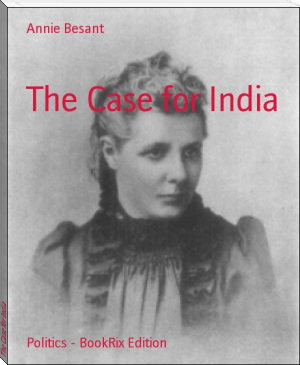The Case for India - Annie Besant (book series for 12 year olds TXT) 📗

- Author: Annie Besant
Book online «The Case for India - Annie Besant (book series for 12 year olds TXT) 📗». Author Annie Besant
of the interests of the Indian people.
It is sometimes said: "Why harp on these figures? We know them." Our answer is that the fact is ever harping in the stomach of the people, and while it continues we cannot cease to draw attention to it. And Gokhale urged that "even this deplorable condition has been further deteriorating steadily." We have no figures on malnutrition among the peasantry, but in Madras City, among an equally poor urban population, we found that 78 per cent. of our pupils were reported, after a medical inspection, to be suffering from malnutrition. And the spareness of frame, the thinness of arms and legs, the pitiably weak grip on life, speak without words to the seeing eye. It needs an extraordinary lack of imagination not to suffer while these things are going on.
The peasants' grievances are many and have been voiced year after year by this Congress. The Forest Laws, made by legislators inappreciative of village difficulties, press hardly on them, and only in a small number of places have Forest Panchayats been established. In the few cases in which the experiment has been made the results have been good, in some cases marvellously good. The paucity of grazing grounds for their cattle, the lack of green manure to feed their impoverished lands, the absence of fencing round forests, so that the cattle stray in when feeding, are impounded, and have to be redeemed, the fines and other punishments imposed for offences ill-understood, the want of wood for fuel, for tools, for repairs, the uncertain distribution of the available water, all these troubles are discussed in villages and in local Conferences. The Arms Act oppresses them, by leaving them defenceless against wild beasts and wild men. The union of Judicial and Executive functions makes justice often inaccessible, and always costly both in money and in time. The village officials naturally care more to please the Tahsildar and the Collector than the villagers, to whom they are in no way responsible. And factions flourish, because there is always a third party to whom to resort, who may be flattered if his rank be high, bribed if it be low, whose favour can be gained in either case by cringing and by subservience and tale-bearing. As regards the condition of agriculture in India and the poverty of the agricultural population, the Bureaucracy is inefficient.
The application of Mr. Gokhale's first test to Indian handicrafts, to the strengthening of weak industries and the creation of new, to the care of waterways for traffic and of the coast transport shipping, the protection of indigo and other indigenous dyes against their German synthetic rivals, etc., would show similar answers. We are suffering now from the supineness of the Bureaucracy as regards the development of the resources of the country, by its careless indifference to the usurping by Germans of some of those resources, and even now they are pursuing a similar policy of _laissez faire_ towards Japanese enterprise, which, leaning on its own Government, is taking the place of Germany in shouldering Indians out of their own natural heritage.
In all prosperous countries crafts are found side by-side with agriculture, and they lend each other mutual support. The extreme poverty of Ireland, and the loss of more than half its population by emigration, were the direct results of the destruction of its wool-industry by Great Britain, and the consequent throwing of the population entirely on the land for subsistence. A similar phenomenon has resulted here from a similar case, but on a far more widespread scale. And here, a novel and portentous change for India, "a considerable landless class is developing, which involves economic danger," as the _Imperial Gazeteer_ remarks, comparing the census returns of 1891 and 1901. "The ordinary agricultural labourers are employed on the land only during the busy seasons of the year, and in slack times a few are attracted to large trade-centres for temporary work." One recalls the influx into England of Irish labourers at harvest time. Professor Radkamal Mukerji has laid stress on the older conditions of village life. He says:
The village is still almost self-sufficing, and is in itself an
economic unit. The village agriculturist grows all the food
necessary for the inhabitants of the village. The smith makes
the plough-shares for the cultivator, and the few iron utensils
required for the household. He supplies these to the people,
but does not get money in return. He is recompensed by mutual
services from his fellow villagers. The potter supplies him
with pots, the weaver with cloth, and the oilman with oil. From
the cultivator each of these artisans receives his traditional
share of grain. Thus almost all the economic transactions are
carried on without the use of money. To the villagers money is
only a store of value, not a medium of exchange. When they
happen to be rich in money, they hoard it either in coins or
make ornaments made of gold and silver.
These conditions are changing in consequence of the pressure of poverty driving the villagers to the city, where they learn to substitute the competition of the town for the mutual helpfulness of the village. The difference of feeling, the change from trustfulness to suspicion, may be seen by visiting villages which are in the vicinity of a town and comparing their villagers with those who inhabit villages in purely rural areas. This economic and moral deterioration can only be checked by the re-establishment of a healthy _and interesting_ village life, and this depends upon the re-establishment of the Panchayat as the unit of Government, a question which I deal with presently. Village industries would then revive and an intercommunicating network would be formed by Co-operative Societies. Mr. C.P. Ramaswami Aiyar says in his pamphlet, _Co-operative Societies and Panchayats_:
The one method by which this evil [emigration to towns] can be
arrested and the economic and social standards of life of the
rural people elevated is by the inauguration of healthy
Panchayats in conjunction with the foundation of Co-operative
institutions, which will have the effect of resuscitating
village industries, and of creating organised social forces.
The Indian village, when rightly reconstructed, would be an
excellent foundation for well-developed co-operative industrial
organisation.
Again:
The resuscitation of the village system has other bearings, not
usually considered in connection with the general subject of
the inauguration of the Panchayat system. One of the most
important of these is the regeneration of the small industries
of the land. Both in Europe and in India the decline of small
industries has gone on _pari passu_ with the decline of farming
on a small scale. In countries like France agriculture has
largely supported village industries, and small cultivators in
that country have turned their attention to industry as a
supplementary source of livelihood. The decline of village life
in India is not only a political, but also an economic and
industrial, problem. Whereas in Europe the cultural impulse has
travelled from the city to the village, in India the reverse
has been the case. The centre of social life in this country is
the village, and not the town. Ours was essentially the cottage
industry, and our artisans still work in their own huts, more
or less out of touch with the commercial world. Throughout the
world the tendency has been of late to lay considerable
emphasis on distributive and industrial co-operation based on a
system of village industries and enterprise. Herein would be
found the origins of the arts and crafts guilds and the Garden
Cities, the idea underlying all these being to inaugurate a
reign of Socialism and Co-operation, eradicating the entirely
unequal distribution of wealth amongst producers and consumers.
India has always been a country of small tenantry, and has
thereby escaped many of the evils the western Nations have
experienced owing to the concentration of wealth in a few
hands. The communistic sense in our midst, and the fundamental
tenets of our family life, have checked such concentration of
capital. This has been the cause for the non-development of
factory industries on a large scale.
The need for these changes--to which England is returning, after full experience of the miseries of life in manufacturing towns--is pressing.
Addressing an English audience, G.K. Gokhale summed up the general state of India as follows:
Your average annual income has been estimated at about L42 per
head. Ours, according to official estimates, is about L2 per
head, and according to non-official estimates, only a little
more than L1 per head. Your imports per head are about L13:
ours about 5s. per head. The total deposits in your Postal
Savings Bank amount to 148 million sterling, and you have in
addition in the Trustees' Savings Banks about 52 million
sterling. Our Postal Savings Bank deposits, with a population
seven times as large as yours, are only about 7 million
sterling, and even of this a little over one-tenth is held by
Europeans. Your total paid-up capital of joint-stock companies
is about 1,900 million sterling. Ours is not quite 26 million
sterling, and the greater part of this again is European.
Four-fifths of our people are dependent upon agriculture, and
agriculture has been for some time steadily deteriorating.
Indian agriculturists are too poor, and are, moreover, too
heavily indebted, to be able to apply any capital to land, and
the result is that over the greater part of India agriculture
is, as Sir James Caird pointed out more than twenty-five years
ago, only a process of exhaustion of the soil. The yield per
acre is steadily diminishing, being now only about 8 to 9
bushels an acre against about 30 bushels here in England.
In all the matters which come under Gokhale's first test, the Bureaucracy has been and is inefficient.
Give Indians a Chance.
All we say in the matter is: You have not succeeded in bringing education, health, prosperity, to the masses of the people. Is it not time to give Indians a chance of doing, for their own country, work similar to that which Japan and other nations have done for theirs? Surely the claim is not unreasonable. If the Anglo-Indians say that the masses are their peculiar care, and that the educated classes care not for them, but only for place and power, then we point to the Congress, to the speeches and the resolutions eloquent of their love and their knowledge. It is not their fault that they gaze on their country's poverty in helpless despair. Or let Mr. Justice Rahim answer:
As for the representation of the interests of the many scores
of millions in India, if the claim be that they are better
represented by European Officials than by educated Indian
Officials or non-Officials, it





Comments (0)